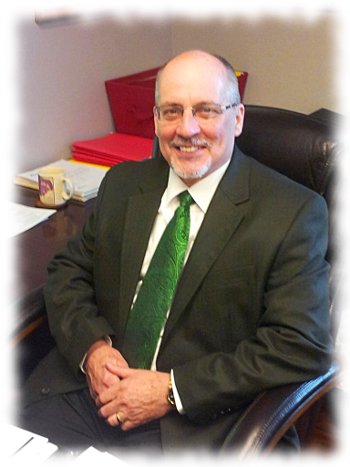God, Church, and Country
by Pastor Edwin Lehmann on November 15, 2018 in Matthew 22:15-22
Sermon for 22nd Sunday after Pentecost October 21, 2018
Text: Matthew 22:15-22 ILCW-A 18:2089
Theme: God, Church, and Country
Look up here, at the front of the church. Everything here has something to do with God’s grace in our lives of faith.
For example, here’s the baptismal font. At it God promises: “Baptism now saves you….All who are baptized into Christ have been clothed with Christ” (1 Pt.3; Ga.3). Here’s the pulpit and the Bible where God’s Word is proclaimed for salvation. That Word will not return to Him empty, but will accomplish the purposes for which He sends it (Is.55). Here’s the altar on which the Sacrament of Holy Communion is laid. In it we receive Christ’s body and blood given for us for the remission of our sins. These are more than symbols. These are the Means of Grace through which God comes to redeem, sanctify, and give us life through faith.
There is symbolism here also. For example, we have candlesticks there and the eternal light there. They remind us that Jesus is “the Light of the world” and that His Word is a “lamp to our feet” to guide us safely from here to eternity. Then there are the various symbols on the paraments. They remind us of truths about God and salvation. All these appointments have meaning and portray a vital part of God’s grace to us in Christ.
Now what about these (the flags)? Some people think that it is not important or even appropriate to have them here. Sometimes I wonder too. All these other things point to things which God does for us. But flags don’t seem to portray so much what God does as much as what we are to do – give allegiance to something. They don’t seem to reflect matters of His saving grace. Because of that, some Christians feel it would be better not to have flags in church. Besides that, sometimes the country or the leaders that stand behind this flag (American) no longer seem to reflect Christ-centered things. So why do flags stand here in God’s holy sanctuary?
These flags are not here to stir allegiance within us as much as they are here to portray other aspects of God’s gracious dealings with His people. They remind us of truths Jesus addressed today.
Christians are citizens living in two kingdoms that God has given for our temporal and eternal welfare. These kingdoms have different functions and they deserve different honor from us. By grace we live in both. This is about God, Church, and Country.
I. Each has a different function and works in different ways.
Let’s first start with the Church and its function. I’m not talking about this, a building, nor even the particular congregation that gathers within it. I’m talking about the Holy Christian Church, the Communion of Saints, the assembly of all believers who, in the past, the present, and the future cling to Christ alone for salvation. As the Church is in the world, it could be called God’s kingdom on earth. It’s not political but spiritual. It’s not visible, but invisible for Jesus said, “It is within you” (Lk.17:21). The Church “is in the world, but not of the world” (Jn.17:16). And its job, its function is different. It is “to preach the Gospel to every creature…to make disciples for Christ of all nations.” Its purpose is soul-saving.
What about the function of the country, or more specifically, the government? Is it there to save souls? No. It’s there to protect the body, to guard and promote the outward welfare of people by preserving order. That’s why Paul told Timothy (1:2:2), “Pray for kings and all those in authority, that we may live peaceful and quiet lives.” The government of our country is to protect life, property, and business. It has a body-saving purpose. See the difference?
They also work in two different ways. The Church works by preaching God’s Word, baptizing, calling to repentance, proclaiming God’s forgiveness in Christ, distributing Holy Communion, and pointing towards eternity. It proclaims the Gospel of God’s redeeming love in Christ. It doesn’t strike with the sword, like Peter did in the Garden of Gethsemane. It’s not to stuff the ballot box or stump the communities with political speeches, as though matters of God’s grace or conscience are to be voted on. Its purpose is to preach the good news of a Savior to regenerate the dead heart of sin. It uses means that give life with God and saves soul and body for eternity.
On the other hand the country works differently with laws which the government enforces. Many are not even divinely given laws, but are developed through human history, reason, experience, and usually in line with God’s moral law – the 10 Commandments. It puts people behind bars for disobedience, handcuffs them for crimes against society, and gives tickets. It expects compliance. That’s force, not love. Completely different from the Church in function and work. And it uses different tools to get the job done.
So, don’t expect the government of the country to accomplish what Christ has delegated to the Church. And do not expect the Church to do what God has delegated to the country. They have different functions, roles, and work. Yet, both are divinely instituted and given for our good – one for the soul, the other for the body – Church and Country. Christians live as citizens in two kingdoms, given by God for our eternal and temporal welfare.
II. And so it follows that we give to each different honor and offerings. That’s what Jesus addressed in our text when He said, “Give to God what is God’s, and give to Caesar what is Caesar’s.” In those words “Caesar” stands for country and its governing authorities that are temporary. And “God” stands for His heavenly kingdom, a kingdom of grace in Christ Jesus that lasts forever. Let’s start with that one.
You know, before you can give anything to God, you have to first receive it from Him, because “the earth is the Lord’s and everything in it.” You have nothing of your own that is not first His. Everything you have you have received from His hand. And the one thing you have that has highest and holiest significance is that which lasts forever – your spiritual and eternal life in Christ.
Once it was not yours. We lost eternal life when Adam and Eve sinned and we continued in our disobedience. But in Christ God’s gracious rule of life was restored when He died for our sin and rose from the dead to give us victory over death. Through faith in that we have peace with God, a good conscience, a sanctified heart, and joy. We are alive again before Him. We are more than just citizens of some land here in this world; heaven is our home from which we await a Savior to take us out of this world of turmoil. That eternal “country” has permanent, everlasting value.
Having received that, what does God look for in us? He doesn’t need taxes for heaven; He doesn’t want us driven there by laws and penalties; He doesn’t want forced compliance – He wants hearts warmed by a Savior, gratefully giving devotion and willing service to the Gospel. So it is that Paul encouraged believers, “Brothers, I urge you in view of God’s mercy, to offer your bodies as living sacrifices, holy and pleasing to God – this is your spiritual act of worship” (Ro.12:1). Or as Paul wrote in our Epistle Lesson this morning, we offer Him “work produced by faith, labor prompted by love, and endurance inspired by hope in our Lord Jesus Christ.” We give different honor and offerings to Christ and His kingdom.
And we give other honor and offerings to the country. “Give to Caesar what is Caesar’s.” Jesus said. “Submit to the authorities.” Paul adds (Ro.13:5f). “If you owe taxes, pay taxes; if revenue, then revenue; respect, then respect; honor, then honor…for rulers hold no terror for those who do right, but for those who do wrong….He is God’s servant to do you good…an agent of wrath to bring punishment on the wrongdoer….they give their time to governing.”
We owe obedience to the laws of the land. We could owe taxes. We could owe military service (Lk.3:14). We owe honor, even though we may disagree about matters. We owe them our prayers to God that they may govern things wisely for the welfare of our bodies. But if they tell us to do that which is against God’s will, we must say with Peter and John, “We must obey God rather than men” (Acts 4). To God we owe honor for the good of body and soul. So we gratefully offer Him ourselves in Christ Jesus.
These two flags standing before you are not here for patriotic or political purposes. They are here, like all the rest of our appointments, to remind us of God’s gracious blessings to the body and, most importantly, to the soul so that we give thanks to Him for everything. It’s about God, Church, and Country and understanding and honoring them correctly. God grant it to us in faith for Jesus’ sake. Amen.

